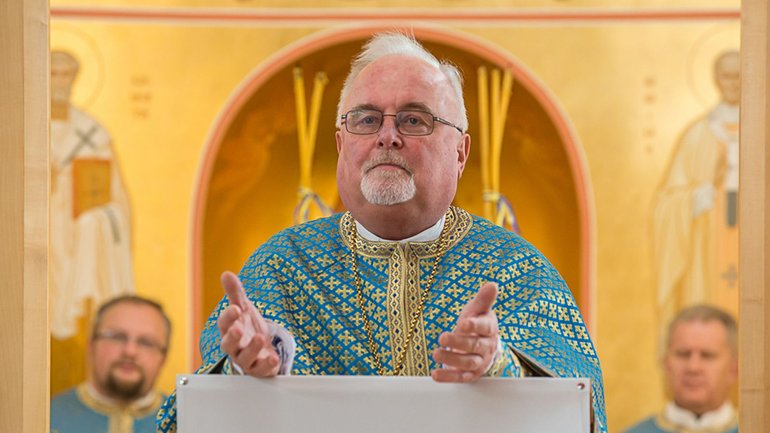Joint Celebration of Easter: Is There a Desire to do so?

To clarify the situation, whether there is a chance that Christians in the world, in their ecumenical majority, will be able to come to an understanding on a common date for Easter and why it is so difficult to unite Christians regarding the common celebration of Easter, RISU turned to the President of the Institute of Ecumenical Studies (IES) of the Ukrainian Catholic University, a member of the International Joint Commission for Theological Dialogue between the Orthodox and Catholic Churches, Fr Iwan Dacko.
Before I go on to answer this question, I would like to say something about how I have celebrated all the Christian holidays so far. I am a son of the Ukrainian diaspora, where we celebrated all the holidays according to the Julian calendar. The main reason why we did this was because we wanted to celebrate these holidays in the same way as all of Ukraine, which was enslaved at the time. Although in my youth, particularly in the United States, Brazil, and Argentina, some Ukrainian Greek Catholics switched to the new Gregorian calendar, when Patriarch Joseph arrived in Rome in 1963, he confirmed that our church would celebrate all holidays according to the Julian calendar until a Council or Synod of the UGCC decided otherwise. Therefore I have always celebrated all holidays according to the Julian calendar.
When we talked with Patriarch Josyf about the calendar issue, he always repeated that we should approach it with great prudence, because our faithful are very sensitive to this issue and it has often led to splits in our Church. He once reminded us that in 1920, when Metropolitan Andrey Sheptytsky visited our communities in the United States and Canada, Bishop Hryhoriy Khomyshyn introduced the Gregorian calendar in the Stanislaviv Eparchy. Upon returning to Lviv, the Metropolitan wrote a letter to Bishop Khomyshyn that he had no right to introduce the new calendar on his own. The metropolitan added that even he, as the head of our Church, as a metropolitan, had no right to do so because such a decision could only be made by the Council (Sobor), or at least the Synod of our Church. It thshould be noted that Bishop Khomyshyn withdrew his initial decision, and the Stanislaviv Eparchy began to celebrate all the feasts according to the Julian calendar again.
Patriarch Josyf also reminded us that before the signing of the Union of Brest (1595/96), the bishops of the Kyivan Church in point 6, which refers to the calendar issue, stated that "As to the new calendar, if the old one cannot be followed, we will accept it, but without violating Easter and our holidays, as it was at the time of mutual agreement because we have some special holidays of our own, which the Roman gentlemen do not have...".
Now for the date of Easter. When the Church was persecuted in the Roman Empire during the first three centuries, it was difficult for it to make decisions for all Christians. It was easier with the fixed feasts but harder to set the date of Easter.
At the end of the second century, during the pontificate of Pope Victor I (188-199), a kind of strife, or rather controversy, broke out over the date of Easter. The point was not to celebrate Easter at the same time as the Jews celebrate their Passover, 14 Nisan, as some Christians in Asia Minor did. St Irenaeus of Lyons (135-200) played a great role in preventing a split, although he was a native of Smyrna (today Izmir in Turkey), he was elected bishop of Lyons in France. He was the author of the famous treatise Adversus heareses [Against Heresies], which he wrote around 180. Although it did not come to a schism, thanks to the mediation of St Irenaeus, the question of the celebration of Easter was not completely resolved.
As soon as Constantine became emperor of the Roman Empire (303-337) and officially recognised Christianity throughout the empire with the Edict of Milan (313), laws could be introduced that would bind the Christians of the world. It was Constantine who convened the first Ecumenical Council in Nicaea in 325, and it also discussed, among other things, the issue of Christian holidays. This process lasted for two centuries, until the reign of Emperor Justinian (527-565). During that time, the dates of Christmas (25th December) and many other fixed holidays were set.
Regarding the celebration of Easter, it was somewhat more complicated, because it was and is always celebrated on Sunday. The first Council of Nicaea established a method for calculating Easter. It took into account the solar and lunar calendars. The solar calendar because it is more accurate, and the lunar calendar because it is a biblical tradition and Christ celebrated Easter (Passover), which was determined on the basis of the lunar calendar. Since then, Easter has not been celebrated on the same day. According to this rule, it is celebrated on the first Sunday after the full moon after the vernal equinox. That is, after the vernal equinox, they wait for the full moon, and after it, on the first Sunday, they celebrate the Resurrection of the Lord. However, if the Christian Easter holiday were to fall on the same day as the Jewish Passover, Christians would have to celebrate it one week later.
Over time, it became clear that the astronomical data of the Julian calendar were outdated. To update them, the so-called Gregorian calendar was introduced. It was more accurate, as the Julian calendar's error in astronomical calculations was one day for every 128 years. The new calendar was proclaimed by Pope Gregory XIII (1572-1585), but it was not accepted by the Orthodox Churches. Then the Ecumenical Patriarchate, under the threat of an excommunication, strictly forbade the Orthodox Churches to implement the Gregorian calendar. Let us also not forget that the Protestant and Anglican Churches introduced the Gregorian calendar within the eighteenth and early twentieth centuries.
In the twentieth century, the majority of Orthodox Churches switched to the so-called New Julian calendar, which was introduced in 1923 in the Orthodox world by Ecumenical Patriarch Meletios IV (1921-1935). Initially, this decision was supported by the Orthodox Churches of the Greek world. In general, it was adopted by the following Churches: Ecumenical Patriarchate, Alexandria, Antioch, Greek (Hellenic), Cyprus, Albanian, Romanian, Bulgarian and Orthodox Churches of the Czech Republic and Slovakia. In 2023, the Orthodox Church of Ukraine joined them. Several Eastern Catholic Churches also live by this calendar, namely the Bulgarian GCC, the Greek-Byzantine Catholic Church and the Romanian GCC. In fact, after the calendar reform, the UGCC is close to this group.
But when it comes to calculating Easter, all of these Churches adhere to the old calendar. This is where the discrepancy in the calculations comes in. That is, the method is the same, but some Christians calculate the date of the vernal equinox according to the Gregorian calendar (21st March), while others calculate it according to the Julian calendar (3rd April). Sometimes the Easter holiday coincides. But in most cases, there is a difference of one to five weeks, as there was this year.
Today, this difference is very noticeable, because while those who follow the Julian or New Julian calendars will celebrate Easter on 5 May, those who have adopted the Gregorian calendar will already celebrate the Sunday of the Blind from Birth, and in four days they will complete the Easter celebration and commemorate the Ascension of Christ. It seems to divide Ukrainians even more: those who live in the Ukraine and those in the diaspora.
And there is no need to emphasise that any calendar form without a solution to the celebration of Easter will be incomplete. As Patriarch Joseph used to say, it is like buying a pair of trousers with two сolours, one black and the other white. For Easter is "the feast of feasts, most solemn day", all the moving feasts depend on Easter, and the number of hymns begins with the feast of Easter, etc.
How can we come to a common date for Easter? It is very important that a joint commission of Catholics and Orthodox on the calendar issue, in particular, on the joint celebration of Easter, be established. We also know that a few years ago, both Pope Francis and Patriarch Bartholomew expressed their desire and created a separate commission for the joint celebration of Easter. Thus, the desire of the Pope and the Ecumenical Patriarch is to reach a mutual agreement and celebrate Easter together for at least two reasons:
a) Because in 2025 the whole Church will celebrate the 1700th anniversary of the first Ecumenical Council of Nicaea;
b) Because in 2025, according to the Gregorian and Julian calendars, we will celebrate Easter together on 20 April 2025.
It is known that Fr Hyacinthe Destivelle, OP, was named by Pope Francis as a member of this Commission. I asked him in Alexandria in June 2023 how things are going with this Commission and whether there is any hope that next year we will celebrate Easter together - Orthodox and Catholics - regularly? The answer was that the Commission was not working with great enthusiasm for several reasons:
а) In the current situation, the Russian Orthodox Church will never accept the position of the Patriarchate of Constantinople, and this Church will most likely be followed by the Antiochian, Serbian, and perhaps also the Georgian and Polish Churches.
b) Even if there were no such difficulty, there is no unanimity or agreement among the other Orthodox Churches on the common celebration of Easter. However, if Pope Francis and Ecumenical Patriarch Bartholomew I put pressure on their members of the Commission, they may - although Fr Destivelle doubts it - come to a common agreement.
Roman Catholics and Protestants are also indifferent to this issue as if it does not apply to them.
This is the situation with the joint celebration of Easter.
There will always be difficulties, as with every project that is a turning point. However, if we come to a joint celebration of Easter, it will be a tremendous step towards the unity and communion of the Catholic and Orthodox Churches.
It is a very important and positive fact that both Pope Francis and Ecumenical Patriarch Bartholomew I want this, and the latest statement of Patriarch Bartholomew in this regard is very promising.
I would like to remind you that recently the media reported that Ecumenical Patriarch Bartholomew, on Sunday, 31 March 2024, greeting those who celebrated the Resurrection of Christ on that day, said, in particular: “On this day, the timeless message of the Resurrection resonates more profoundly than ever, as our non-Orthodox Christian brethren and sisters commemorate the resurrection of our Lord from the dead, celebrating Holy Easter. We have already sent our representatives to all the Christian Communities of the confessions here, to extend our heartfelt wishes of the Holy Great Church of Christ and our Patriarchal congratulations. But also from this position we extend a heartfelt greeting of love to all Christians around the world who celebrate Holy Easter today. We beseech the Lord of Glory that the forthcoming Easter celebration next year will not merely be a fortuitous occurrence, but rather the beginning of a unified date for its observance by both Eastern and Western Christianity.This aspiration is particularly significant in light of the upcoming 1700th anniversary in 2025, marking the convening of the First Ecumenical Synod in Nicaea. Among its pivotal discussions was the matter of establishing a common timeframe for the Easter festivities. We are optimistic, as there is goodwill and willingness on both sides. Because, indeed, it is a scandal to celebrate separately the unique event of the one Resurrection of the One Lord!“
I think that such churches that have already adopted the New Julian calendar could support this decision.
However, to implement this, one must have a great desire to do so.
While the joint commission on the calendar issue has not yet completed its work, the Joint International Commission for Theological Dialogue between the Orthodox and Catholic Churches meets from time to time. The issue of the calendar has not been the main topic of the meetings so far, although both Orthodox and Catholics have raised it during discussions. We talked about it primarily on a private level, during personal meetings. As for the proposals, I believe that one was realistic, namely that we all celebrate Easter on the first Sunday after the 15th April, according to the new calendar. I personally think this proposal is feasible. However, the Commission has not yet made any final decision.
We, Ukrainians, will not be able to resolve this issue ourselves, but we can encourage conversations about it, support the aspirations of the bishops of Rome and Constantinople in their desire to find a solution that will unite Christians around a single date for the celebration of the Resurrection of Christ.










